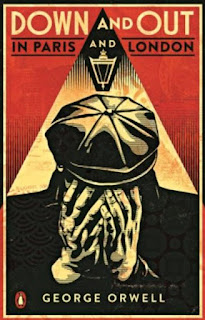Down and Out in Paris and London
I read Orwell’s Homage to Catalonia in 2015 and was impressed by his depiction of Barcelona, and the intimate picture of his involvement in the POUM in the early days of the Spanish Civil War. I think I expected something similar of Down and Out in Paris and London, which is of course quite ridiculous, given not on the different cities but also the civilian life he sets out to describe. I suppose what I mean to say is that because Orwell has such a huge reputation for political insight (from later works) I had possibly expected more social commentary or critique of an intellectual kind. What Orwell does instead, of course, is to write a memoir in which he documents his experiences of poverty in Paris, and in London. In themselves, both depictions are devastating critiques, without the ‘argument’ (the experiences of poverty he describes largely speak for themselves).
In Paris, Orwell – or his speaker in the case of that
necessary separation between writer and actor, even in a memoir – works as a plongeur, first for a large hotel and
then for a small establishment, just opened. Prior to this employment, he has
been forced to pawn his little possessions and most of his clothes, and has
already discovered ‘the secrecy attaching to poverty’ (p.14) as he initially
reduces the former activities that had seemed normal and suddenly seem costly
(such as sending clothes to the laundry). He has met a Russian comrade, Boris,
and through an act of humanity gained a ‘mate’ to share the hardship and scheme
together. Indeed, in the early chapters, the relationship between the two has a
comic-tragic nature, and I wondered at times whether the pair had even inspired
Samuel Beckett’s Waiting for Godot in
at least some indirect way (consider the scheming, the waiting, the class
discourse, the hope and despair). In Chapter XIV, Orwell describes the social
life of the hotel, including the status of cooks and waiters, and the pride all
take in their work, however servile (and indeed the revenge they take on
patrons through the abject scenes behind the closed doors where food is prepared
for the guests and filth prevails). It is altogether a completely different
view of Paris as one finds, for example, in Hemingway – who appears to think
himself a friend to waiters but has not been ‘behind the scenes’ in Orwell’s
way.
In London, things don’t improve for our correspondent. With
money running down, he starts in some rather awful lodging houses (after
exchanging his suit for rags and a few coins). Orwell presents the life of a
tramp, who moves between ‘spikes’ once the money has run out, and meets various
destitute men who alternate between daily street life, and ‘locked in’ “accommodation”.
A ‘spike’ is something like a ‘casual’ position in a workhouse: men are
admitted after six in the evening; forced to take a humiliating inspection and
wash; given some very poor food and a cell to sleep in, without a bed; and
turned out on the streets again the next morning, after – perhaps – being asked
to do some menial work. Orwell introduces some characters to give the reader
some sense of who these men are, such as a fallen artisan and a self-educated
Irishman. He takes a chapter to describe London cockney language and slang, and
another to dismiss myths about lazy tramps who might be ‘playing the system’ (a
tramp’s life, he makes clear, is one of misery and deprivation). In a short
final chapter, Orwell concludes with a few brief insights, penned with due
humility:
“My story ends here. It is a fairly trivial story, and I can
only hope that it has been interesting in the same way as a travel diary is interesting.
I can at least say, Here is the world that awaits you if you are ever penniless
… I shall never again think that all tramps are drunken scoundrels, nor expect
a beggar to be grateful when I give him a penny, nor surprised if men out of
work lack energy, no subscribe to the Salvation Army, not pawn my clothes, nor
refuse a handbill, nor enjoy a meal at a small restaurant. That is a beginning’
(pp.229-230).
These last comments include some in-jokes for the reader.
For example, he cannot enjoy a meal in a small restaurant because he
understands what goes on behind the scenes to make the food ‘ready’ to serve;
he knows now that the poor despise the joyless cleanliness of Salvation Army
hostels that humiliate the men they feed. And as for the beginning – it is
Orwell’s way of saying that there is much more to learn about the life he
describes in this memoir. For most of us, who have never experienced genuine
hardship, or poverty, desperation and hunger, it is a telling way to end a
rather frank appraisal of life on the streets, and life ‘just above’ that.
(See also my thoughts on Keep the Aspidistra Flying).




Comments
Post a Comment